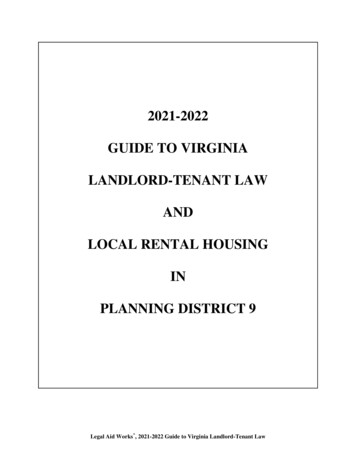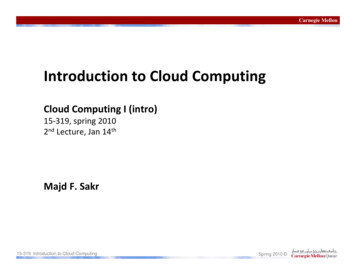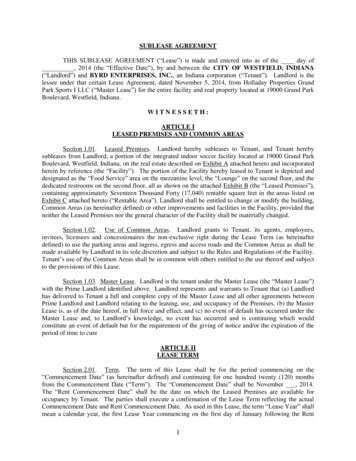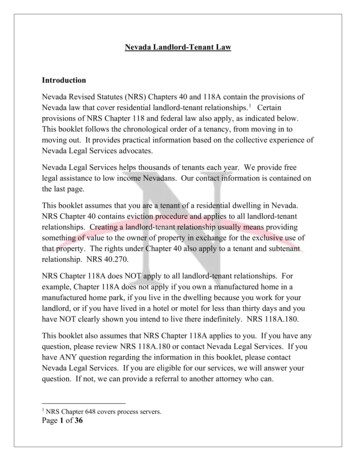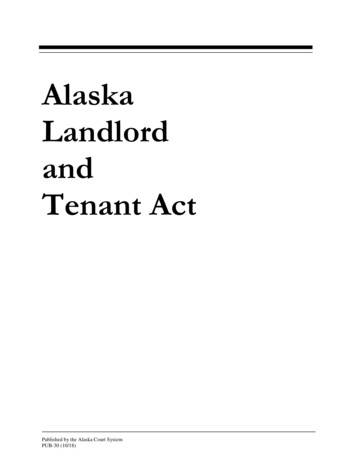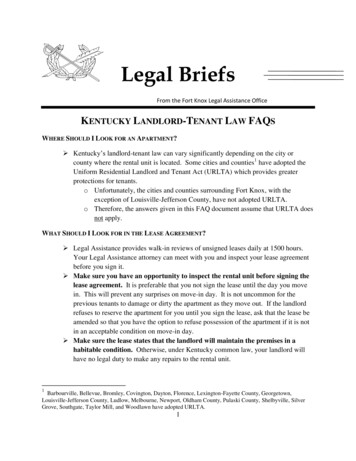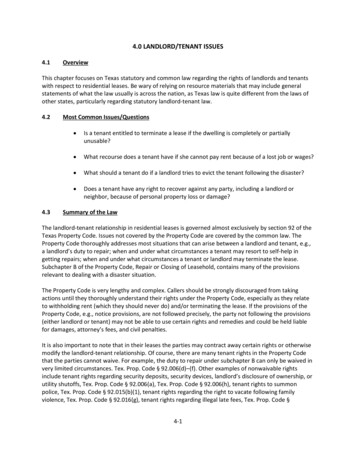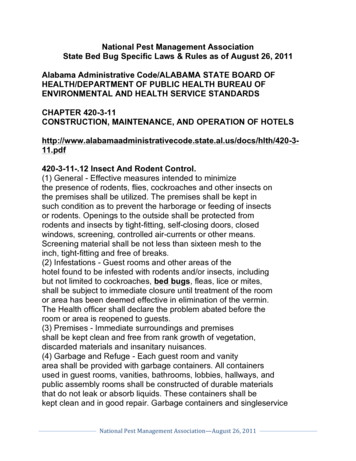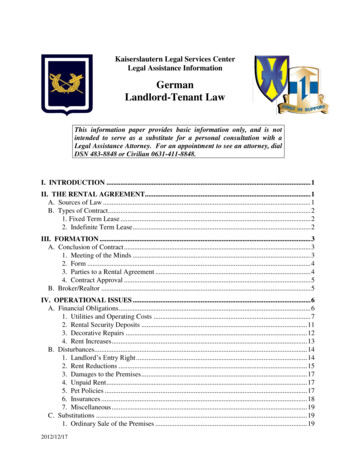
Transcription
Kaiserslautern Legal Services CenterLegal Assistance InformationGermanLandlord-Tenant LawThis information paper provides basic information only, and is notintended to serve as a substitute for a personal consultation with aLegal Assistance Attorney. For an appointment to see an attorney, dialDSN 483-8848 or Civilian 0631-411-8848.I. INTRODUCTION . 1II. THE RENTAL AGREEMENT. 1A. Sources of Law . 1B. Types of Contract . 21. Fixed Term Lease . 22. Indefinite Term Lease . 2III. FORMATION . 3A. Conclusion of Contract . 31. Meeting of the Minds . 32. Form . 43. Parties to a Rental Agreement . 44. Contract Approval . 5B. Broker/Realtor . 5IV. OPERATIONAL ISSUES . 6A. Financial Obligations . 61. Utilities and Operating Costs . 72. Rental Security Deposits . 113. Decorative Repairs . 124. Rent Increases . 13B. Disturbances. 141. Landlord’s Entry Right . 142. Rent Reductions . 153. Damages to the Premises . 174. Unpaid Rent . 175. Pet Policies . 176. Insurances . 187. Miscellaneous . 19C. Substitutions . 191. Ordinary Sale of the Premises . 192012/12/17
II2. Foreclosure Sale of the Premises . 193. Insolvency and Judicial Receivership. 20V. GERMAN CUSTOMS & CULTURAL DIFFERENCES . 22VI. TERMINATION . 23A. Terminating the Rental Agreement . 231. Basic Requirements . 232. Termination Clause and Termination Agreement . 253. Ordinary Termination (for Cause) § 573 BGB) . 264. Extraordinary Termination (effective immediately) (§ 543 and § 569 BGB) . 275. Extraordinary Termination (with statutory notice period). 286. Termination upon creating Condominiums . 287. Tenant’s Right to Protest . 298. No Termination by Death or Destruction . 299. Eviction and Holdover Tenant. 30B. Statute of Limitations. 301. General Rule . 302. Lapse of Time . 31VII. ANNEX . 32- Ventilation of Housing . 32- AE Form 210-50J-R, Sep 01 and USAFE Form 291a, 20030601: Rental Agreement . 332012/12/17
1I. INTRODUCTIONa. Effective September 1, 2001 tremendous changes have taken place in the area of theGerman Landlord-Tenant Law. Tenants living on the economy will be faced with rentalagreements subject to German law and, therefore, they should know some of the basic Germanrules that govern the landlord-tenant relationship. Furthermore, the legislature modernized theGerman Civil Code (“Bürgerliches Gesetzbuch” – BGB), effective as of January 1, 2002.b. Tenants, looking for private rentals, should seek assistance from the Housing ReferralOffice (HRO). Furthermore, they need to familiarize themselves with the area to consider theirindividual needs. For example, for tenants with children, it may be good to know where theSchool Bus Transportation routes are.c. The HRO keeps lists of landlords that frequently caused trouble or proved to beunreliable landlords in the past and it informs the tenant about possible allowances, e.g., Movingin Housing Allowances (MIHA). Furthermore, the HRO might be able to convince the landlordto use the official HRO rental agreement or at least talk to the landlord about possiblemodifications in light of the tenant's special situation. One of the primary aims is to make a PCStermination clause part of the agreement.II. THE RENTAL AGREEMENTA. Sources of Lawa. Generally the landlord presents a preprinted, standard rental agreement to the tenant.An exception applies where the USAREUR or USAFE HRO rental agreement is used. However,any contract not individually negotiated but presented in a preprinted form will be scrutinized bythe rules governing the general terms and conditions of trade (“AllgemeineGeschäftsbedingungen” - AGB) as codified in § 305 - § 310 BGB. In a preprinted, standardrental agreement any inconsistencies or ambiguities are construed against the party that presentedthe preprinted contract and are settled in the other party's favor (§ 305c para. 2 BGB).b. Basically the parties are free to define their relationship by whatever they agree upon.The courts will uphold their agreement. If the parties fail to address a specific aspect of theirrental relationship, the provisions provided for in the applicable law will be applied. Thelegislature has passed legislation to ensure a minimum of arm's length negotiations and fairdealings as well as to balance the bargaining positions of the parties. Those provisions aremandatory and, therefore, have to be obeyed by all parties. Any clauses to the contrary arevoided by law. The provisions provided for in the applicable law will supersede those clauses.2012/12/17
2c. § 535 BGB contains a simple statement, making it clear that only temporary usage inconsideration for some compensation, e.g., monetary one or services performed, is considered tobe a lease under German law. § 535 BGB reads as follows: "CONTENTS AND CONTRACTUALMAIN OBLIGATIONS OF THE RENTAL AGREEMENT. (1) By the lease contract the landlord shall beobligated to grant usage of the leased object during the term of the lease to the tenant. The landlord shall turn overthe leased object in suitable condition for the contracted usage to the tenant and shall keep it in such condition duringthe lease. He shall be obligated to bear the encumbrances on the leased object. (2) The tenant is obligated to paythe agreed upon rent to the landlord."d. The German rental law provisions in the BGB are contained in the §§ 535 - 580aBGB. They also set forth guidelines for rent increases. However, utilities and operating costs areaddressed in the BetrKV (“Betriebskostenverordnung”, Utilities and Operating Costs Ordinance),while the Second Computation Ordinance (II. BV, "Zweite Berechnungsverordnung") sets forthadditional mainly administrative specifications for landlords.B. Types of Contract1. Fixed Term Leasea. German rental law distinguishes two types of contracts: fixed term lease contracts andindefinite term lease contracts.b. A fixed term lease contract should be avoided. It only runs for a specific fixed-termand cannot be terminated by the tenant (but by the landlord for a reason) during the fixed-term.Generally it allows the landlord to easily evict the tenant once the contract runs out. It does notserve the U.S. Forces personnel's interests. Despite an unexpected early PCS move or an order tomove into government housing, the soldier will not be able to get out-of the contract but remainresponsible for his/her obligations under the contract.c. A fixed term lease can become an indefinite term lease by operation of law if theLandlord lets the tenant stay on after the fixed-term is up or if the Landlord fails to provideupfront in writing a reason why there is a fixed-term (§ 575 BGB). Only one of the followingthree reasons can justify a fixed-term: (i) personal need, (ii) planed major renovation andimprovements, (iii) to be leased to an employee2. Indefinite Term Leasea. The indefinite term lease constitutes the most common residential lease type inGermany. If no specific mention is made, the contract runs for an indefinite period of time, i.e.,until one party terminates it.b. Often the landlord seeks assurances that the tenant will not move out soon again.Therefore, the contract may contain a standard clause or an individual clause, excluding the rightto terminate temporarily (Börstinghaus NJW 2009, 1391). In standard contracts a 2-yearsuspension of termination rights has been upheld (BGH NJW 2004, 3117) whereas a 5-year one2012/12/17
3was found to be void (BGH NJW 2005, 1574), even in case of a staggered rent (BGH NJW 2006,1059). However, by individual agreement a 5-year period may be imposed (BGH NJW 2004,1448; BGH NJW 2011, 59). In a standard contract the courts even upheld a clause establishing aone-sided 4-year suspension of the tenant’s termination right, provided the landlord had opted fora staggered rent (§ 557a BGB) and only if the termination was possible towards the end of the 4year period and not after the 4 years since the signing of the contract (BGH NJW 2006, 1056;BGH NJW 2009, 353; BGH NJW 2011, 597; BGH NJW-Spezial 2011, 162 BeckRS 2011,00120).c. Any clause seeking to exclude the termination right for more than one year has to be inwriting (BGH NJW 2007, 1742).d. Yet, only the right to an ordinary termination can be suspended. The rights to anextraordinary termination (effective immediately) or the right to an extraordinary terminationwith statutory notice period cannot be suspended. Consequently, any such clause needs to bedrafted carefully, particularly since the courts lately tend to interpret the termination clause infavor of the landlord, no longer requiring an explicit reservation but finding an impliedextraordinary termination right sufficient (BGH NJW 2006, 1056 and BGB NJW 2006, 1059).e. Note, such clauses suspending the (ordinary) termination rights temporarily do not turnan indefinite term lease into a fixed term lease. Nevertheless, it is recommendable to refrainfrom such clauses because they defeat the purpose of an indefinite term lease to a certain extent.If the tenant seeks assurances that the landlord will not terminate the lease because of unexpectedpersonal need, he/she may try to get the landlord to agree to a one-sided temporary suspension of(ordinary) termination rights, where the landlord only refrains from terminating the lease due topersonal need.III. FORMATIONA. Conclusion of Contract1. Meeting of the MindsIn order to form a contract, there must be a meeting of the minds. A lease is concluded,when the parties agree upon the following essential parts:-leased object (size & accessories)purpose of the lease (residential or business)duration of the lease (fixed-term or indefinite)consideration. It is sufficient if the parties agree on monetary compensation asconsideration. It is not necessary to agree to a specific amount. In such a case theamount will be determined in accordance with the applicable laws.2012/12/17
42. Forma. Oral rental agreements are valid and fully enforceable. Only a fixed-term lease inexcess of 1 year must be in writing (§ 550 BGB). But even if that requirement is violated, it willnot invalid the oral agreement. Instead the lease will be considered to be merely for an indefiniteterm. The contract does not to be in the German language in order to be valid (PalandtEllenberger, BGB, 71st Ed. 2012, § 126 BGB No. 2; OLG Brandenburg NJW-RR 1999-543).b. Generally speaking a written agreement is preferable. Oral stipulations may beforgotten, denied or remembered differently by the other party. Only a written agreement enablesthe parties to adequately prove the terms of the agreement and to clarify each other's obligationsthereunder. All terms should be reduced to writing and have to be personally signed by theparties or their duly authorized representatives. Where more than one party lives in the house,rules of the house ("Hausordnung") are incorporated into the rental agreement by reference.These create further obligations. Whoever alleges a verbal modification of the written rentalagreement, bears the burden of proof (BGH NJW 2006, 138).c. Yet, there are also advantages to an oral agreement because those are usually veryshort. The landlord does not subject the tenant to all the detailed conditions usually contained ina written agreement. The tenant's obligations are less burdensome. Furthermore, the codifiedrental law provisions apply, which are otherwise often modified in a written agreement to thelandlord's favor, whenever the landlord presents the standard preprinted contract form.3. Parties to a Rental Agreementa. Privity of contract exists only between the contracting parties. Nevertheless, a tenantis generally free to have his/her friend, fiancé(e) or spouse move in without the landlord'sconsent. Such a person is not a party to the rental agreement and, therefore, will not assume therent obligation, unless the person becomes a contracting party as well. The landlord owes thecontractual duties only to the contracting party and that party remains liable for the rent - until atermination becomes effective - even if that party moves out and his/her partner remains in thepremises, e.g., in case of a separation or divorce.b. The moving-in party acquires an inherent possessory and usage right in respect to theapartment. The landlord owes an obligation to protect all members of a household againstinjuries. However, this obligation does not apply to mere visitors. Yet, the tenant can havevisitors of both sexes without nighttime limitations. Furthermore, he/she may have visitors stayas long as 2 months. Up to that time, it would not be considered a sublease, which by contrast,would require approval by a landlord (§ 540 BGB).c. Where two tenants enter in a rental agreement with the landlord, both are also jointlyand severally responsible for the performance of the contractual duties. Without a power ofattorney no spouse can execute a rental agreement on behalf of the other spouse. However, arental agreement usually contains a clause empowering one spouse to act on behalf of the other2012/12/17
5spouse, e.g., to receive correspondence. The landlord normally favors to have both spouses signthe agreement so the landlord gets two debtors and avoids any problem with respect to thelandlord's lien.d. If one of the co-tenants intends to move out, that tenant should obtain a rent releasefrom the landlord. The remaining co-tenant has to agree (impliedly or expressly) to it as well,otherwise the other tenant can exercise a termination right. It is best to enter into a written threeparty agreement, in which one tenant is released from his contractual obligations (BGH NJW2005, 2620).e. As of September 1, 2009, the HausratsVO (Household Goods Regulation) has beenincorporated into the BGB and the new FamFG. According to § 1568a and § 1568b BGB and §204 FamFG a judge may award as part of an upcoming or pending divorce procedure onespouse's property to the other spouse upon request by one spouse. Where there are children, thefamily home will normally be awarded to the custodial parent in case of a separation or pendingdivorce.4. Contract Approvala. It is advisable to add a clause in the rental agreement, which makes it dependent on theHousing Office’s approval. That way housing could review the contract before the tenantobligates himself to any commitment there under.b. The USAFE Form 291a uses the following wording:--This contract is not authorized until processed and countersigned by the Housing ReferralOffice (HRO). This HRO is not a party to the agreement, but is merely acknowledging itsexistence and certifying that the facility has been accepted for occupancy by personnelassigned to this base.Dieser Mitvertrag wird erst dann rechtskräftig, wenn er vom zuständigen Offizier desWohnungsamtes bearbeitet und unterschrieben ist. Das Wohnungsamt ist keineMietpartei des Vertrages; es wird lediglich bestätigt, daß ein Mietvertrag vorliegt und dieWohnung für Standortpersonal zum Bezug genehmigt worden ist.B. Broker/Realtora. A broker cannot charge more for his services than an amount equal to a 2-month netrent (§ 3 WoVermittG, Housing Brokerage Act). Broker’s charges cannot be claimed if thebroker or his employee also manages the apartment (§ 2 para. 2 No. 3 WoVermittG), unless it isa condominium management (BGH NJW 2004, 286; BGH NJW 2003, 1393; Palandt-Sprau,BGB, 71st Ed. 2012, § 652 BGB No. 59).b. Release payments (“Abstandszahlungen”) are illegal in residential leases (§ 4aWoVermittG), i.e., any consideration given to the former tenant by the new tenant or someone2012/12/17
6acting for him/her for clearing the apartment. An exception exists, where the new tenantpromises to do the decorative repairs for the former tenant or pays that tenant’s transportationcosts. As long as the price is reasonable, the new tenant may buy or take over furniture andfixtures from the former tenant. If the price is unreasonable then such a takeover agreement(“Ablösevereinbarung”) will be seen as a disguised release payment.IV. OPERATIONAL ISSUESA. Financial Obligationsa. A thorough study of the rental agreement is essential. The prospective tenant shouldnot rush into the contract but consider his/her financial situation as well to see whether thedesperately desired apartment is affordable. Once the rental agreement comes into effect, thereare substantial costs involved. On the one hand there is a financial commitment, while on theother hand it may take a while before all the allowances go into effect to help the tenant pay forthose costs.-the rent as well as the utilities and operating costs have to be paid on a monthly basisthe security deposit has to be paid during the first three monthstelephone set up feesb. The rent is due in advance no later than the third working day of the month (§ 556bBGB). By definition Sundays and official German holidays are no working days (§ 193 BGB).For the purpose of rent payments, Saturdays are not considered working days neither because allbanks are closed on Saturdays (BGH NJW 2010, 2879). The term "on the landlord's account"means that the money must be posted at the landlord's bank, not the German Post Office. Theburden of proof is fully on the tenant to show he/she paid the rent on time. Absent an agreementto the contrary, European banks are supposed to complete a bank-to-bank Euro-money transferinto the creditor’s account within 3 banking days and non-Euro money transfers within theEuropean Union within 5 banking days (§ 675s BGB). As of January 1, 2012, Euro-moneytransfers are to be completed at the end of the banking day, following the initiation of thetransfer. Note, being consistently late on rent payments, entitles the landlord to terminate therental agreement.c. Provided the tenant informed the landlord in writing one month in advance, he/she canset off any claim for damages against the rent due. If the landlord files for bankruptcy, the renthas to be paid to the administrator of the landlord's assets upon proper notification of thebankruptcy procedure.d. According to Art. 60 para. 5b SA, members with SOFA status are exempted fromradio and television usage fees, collected by the GEZ ("Gebühreneinzugszentrale"- Central FeeCollection Agency). Furthermore, according to Art. 6 para. 1 SA, they are also exempt from2012/12/17
7German regulations in the field of registration of residence (“Meldewesen“) and aliens control(“Ausländerpolizei“), except with respect to registration in hotels and similar establishments(“Beherbergungsstätten“)1. Utilities and Operating Costsa. The tenant will have to pay only for those utilities and operating costs mentioned in therental agreement. However, the landlord may put a clause in the agreement referring to § 2BetrKV (§ 556 para. 1BGB). § 2 BetrKV is an umbrella provision that lists exclusively allapplicable utilities and operational costs in seventeen categories:(01) public charges (e.g., real estate taxes)(02) water supply costs (e.g., costs for exchanging the meter, service fees)(03) drainage costs, sewage costs (e.g., rainwater)(04) central heating costs (e.g., costs involving emission checks, service fees)(05) hot water costs (e.g., service fees)(06) costs for combined heating and hot water systems(07) lift associated costs (e.g., electricity costs, service fees)(08) garbage and street cleaning fees(09) building cleaning costs for common areas and vermin control fees(10) gardening costs(11) costs for common area lights(12) chimney sweeping fees(13) insurance premiums (e.g., property and liability insurance)(14) janitor costs (Costs (2) to (10) and (16) cannot be charged separately if the janitor performsthese services)(15) cots for a common antenna, TV/internet cable, or a satellite dish system(16) laundry room costs (e.g., electricity costs, service fees)(17) miscellaneous fees (e.g., costs for servicing a sauna or swimming pool, maintenance ofsmoke detectors [LG Magdeburg NJW 2012, 544], )b. Tax relief is generally not available on utility bills. Individuals are not entitled to taxrelief in their own name. According to Art. 67, 68 SA only an agent of the U.S. Forces can maketax-free purchases, e.g., Moral Welfare Recreation Funds (MWRF). Yet, in the KMC area such aVAT-relief program has been set up as far as electricity, water, and gas are concerned.c. Utilities are just advance payments. Consequently, they are only estimates of howmuch it will cost. The landlord rarely agrees to a fixed amount. However, the landlord will haveto present to the tenant a detailed list of the overall actual utility costs, unless the parties agreedon a fixed amount. Such a list has to be presented within 12 months following the (annual)billing cycle, otherwise the landlord is prevented from asking for additional amounts to cover theactual annual utility and operational costs (§ 556 para. 3 BGB) but he is free to correct the “final”utility bill within that 12-month period (BGH NJW 2011, 843). Likewise the tenant has 12months, following the receipt of the landlord’s list on utility and operational costs to present anyobjections he/she might have or else be loose the right to protest. For verification of the detailed2012/12/17
8annual utility list, the landlord does not have to present copies of the actual underlying bills to thetenant even if the tenant offers to pay for these, but it is sufficient if the landlord allows thetenant to look at the original bills in his presence (BGH NJW 2006, 1419). Yet, lower courtsallow the tenant to scan/copy the documents (AG München NJW 2010, 78).d. Depending on whether there is a plus or an amount still owed on the annual utilitiesand operational cost bill, the tenant will either have to pay the rest of the amount owed or beentitled to a reimbursement of any surplus. Based on the (correct) utility and operational costsfor the past billing cycle, both parties can demand a modification of the advance payments (BGHNJW 2012, 2186). If there had been a surplus, the tenant may demand smaller monthly advancepayments, while the landlord can demand higher monthly advance payments if there had been adebt. Should the tenant fail to comply and fall substantially into arrears on the adjusted advancepayments on utilities, the landlord can terminate the rental agreement (BGH NJW 2012, 3089).The courts generally allow the annual bill to be based either on the consumption costs for thatperiod (“Verbrauchsprinzip”, “Zeitabgrenzungsprinzip”, “Leistungsprinzip”) or on the actualcosts/bills paid in that period (“Abflußprinzip”, “Abrechnung nach Rechnungen”,“Ausgabenabrechnung”) (BGH NJW 2008, 1300) but for the heating costs which must follow thebelow rules (BGH NJW-Spezial 2012, 226; BGH NJW 2012, 1434).e. A detailed list of the overall actual utility costs will also have to provide informationconcerning the exact manner in which those costs are split between the tenant’s actualcalculations, and credit for the tenant's advance payments. The landlord can base the apportionedshare of the overall costs on actual consumption or the size of the apartment. It can only bebased on the number of persons living in the apartment if specifically agreed thereon. In someinstances there are also special regulations the landlord has to adhere to, e.g., the HeizKVO("Heizkostenverordnung" - Regulation Concerning the Computation of Heating and Hot WaterCosts) requires that at least 50%, up to a maximum of 70%, of the total heating costs arecomputed on the basis of measured consumption (§ 7 HeizKVO). Wireless transmissiontechnology may be installed (§ 554 BGB, § 4 HeizKVO, BGH NJW 2011, 3514). Furthermore,heating costs for commercial and residential leases need to be kept separate (§ 5 para. 2HeizKVO). Watch out for clauses in the lease authorizing the landlord to choose a calculationmethod.f. If the landlord fails to present a detailed list, the tenant has a right of retention (if thelease continues) or can ask his advance payments back, limited to periods for which a right ofretention would have not been possible (if the lease has been terminated); at which point thelandlord may then finally present his/her detailed list, (being prevented from asking for anyadditional money) (BGH NJW 2012, 3508; BGH NJW 2006, 2552; BGH NJW 2005, 1499).g. Any costs relating to meter readings during the year because of a change of tenants arenot considered (reoccurring) utilities IAW § 556 para. 2 sentence 2 BGB but (one time)administrative costs. Unless otherwise agreed in the rental agreement such expenses have to beborne by the landlord alone, even if the law requires him to initiate the reading, e.g,, § 9bHeizKVO (BGH NJW 2008, 575).2012/12/17
9h. Example: Three tenants live in an apartment house with a total floor space of 300square meters, every apartment having the same size (100 sq. meters). The measured heatconsumption in the apartment is: 80 units for tenant A, 95 units for tenant B, and 105 units fortenant C. The heating costs for the year are 5,000 and the landlord calls for the maximum of70% of measured consumption.Basic heating cost portion:30% of 5,000 1,500 1,500 : 300 (sq. meters) 5 /sq. meter5 /sq. meter x 100 (sq. meters) 500measured consumption portion of the heating costs:70% of 5,000 3,500 3.500 : 280 (units) 12.50 /unit12.50 /unit x 80 units (for tenant A) 1,000annual heating bill for tenant A in this case 1,500( 1,500 : 1
Landlord-Tenant Law This information paper provides basic information only, and is not intended to serve as a substitute for a personal consultation with a . rules that govern the landlord-tenant relationship. Furthermore, the legislature modernized the German Civil Code ("Bürgerliches Gesetzbuch" - BGB), effective as of January 1, 2002.
